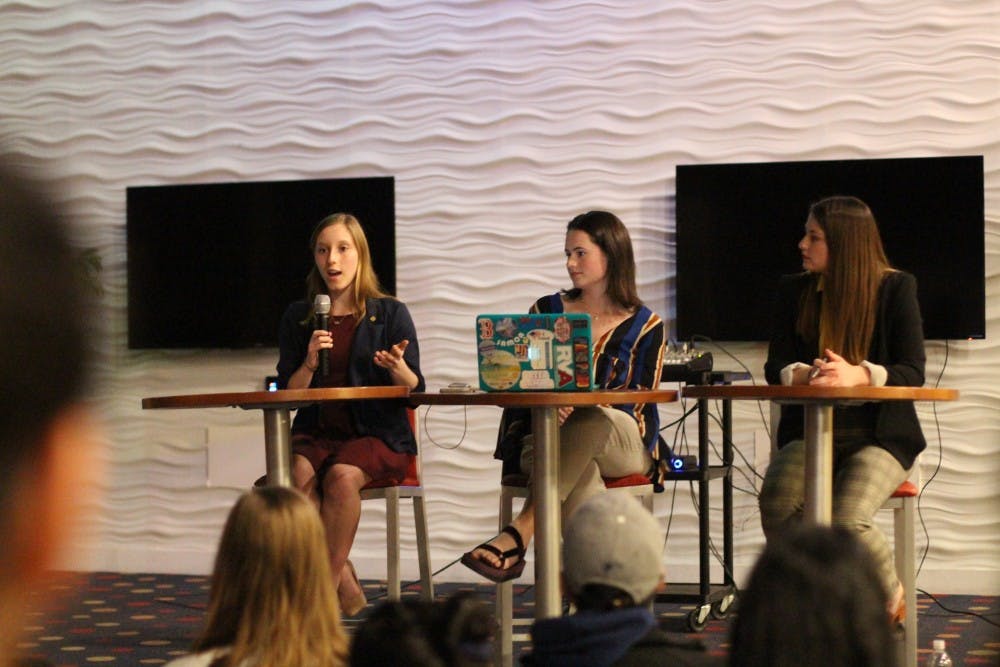Presidential candidates Claire Tate and Lindsey Paul stressed how inclusivity was central to building a better campus environment at the Westhampton College Government Association’s (WCGA) 2019 presidential debate Monday night.
The debate was held in Tyler Haynes Commons at 9:15 p.m. on Monday, April 1, with Monica Stack, senior and current WCGA president, moderating.
During opening remarks, the candidates, who are both juniors, talked about their experience. Tate mentioned her role as founder of Planned Parenthood Generation Action at UR, as well as serving as a WCGA senator. Paul talked about being the WCGA sophomore class president during the 2017-18 school year, as well as her involvement with committees such as the President’s Advisory Committee.
A significant part of Paul’s focus had to do with keeping constant communication, through programs such as the Listening Tour, with different parts of campus, emphasizing her priorities to listen to student voices and gather feedback about what people want.
“The underlying goal that I have for everything that I do next year is that I want to empower students to be the agents of their own experience on this campus,” Paul said, “and that means their social experiences, their academic experiences, their extracurricular experiences, and really anything that they do, even off campus, that what they do on this campus informs.”
Tate emphasized wanting to listen to student organizations and underrepresented, unheard communities.
“A priority of mine would be creating a community of activism and inclusion and empowering students to feel like they can make a difference,” Tate said, “and that if they bring something to student government, that there is capacity for change, and that we don’t go to a school where the institution has complete power over us.”
Paul brought up her aims to work to expand SOBAC’s funding pool to better provide student organizations with the resources they need and to improve on the amount of social opportunities outside of Greek life.
“The biggest problem that has been brought to me by students is that they don’t feel that there are enough opportunities for them to engage socially on this campus,” Paul said. “A lot of the social life is seen as being dictated by Greek life and not everyone is included in that setting. … I’d like students to feel empowered to be able to have their own social experience on this campus that isn’t necessarily dictated by what groups they’re apart of.”
Paul also expressed wanting to create a way for these student organizations to communicate and collaborate on events.
Tate agreed about providing social opportunities but also wanted more physical spaces and new traditions for underrepresented student groups. She discussed her goal to continue to create and adapt campus social spaces for those groups. Tate also said it was worth considering creating a more inclusive campus tradition that was not Greek-oriented or alcohol-oriented to honor changing demographics across campus.
Both candidates expressed wanting to work more closely and align constitutions and election guidelines with the Richmond College Student Government Association (RCSGA).
Enjoy what you're reading?
Signup for our newsletter
One audience member asked how the candidates would go about implementing institutional change within WCGA, such as the addressing the lack of representation and retention of people of color on student government.
Paul answered that she planned to show up as much as possible to different groups on campus, especially the underrepresented ones, to introduce them to WCGA and its values, and talk to them about wanting more student voices.
Tate agreed but added that she had heard that senators who are people of color can feel ostracized, an issue she wanted to combat through frank discussions and check-ins with senators.
“WCGA is an institution that used to be exclusively white women and that can be felt in its history and it needs to be acknowledged,” Tate said. “I think having frank discussions about race and gender within the body to work productively is really important.
“And I think as president, for people of color or gender non-conforming on the body, checking in with them and asking, ‘Are you feeling comfortable speaking in meetings as much as other senators are?’ ‘Are we using inclusive language for gender identification?’”
Another audience question was about whether creating spaces for different groups on campus would exacerbate exclusivity and segregation within the student body in the way lodges have.
Tate disagreed with the rhetoric of segregation, she said. Many more students will have access to places such as the new Multicultural House than the lodges, she said. And creating more representative spaces on campus is not following the trend of exclusivity but a productive response to it, she said.
Paul responded that the Multicultural House was a pilot program and that the next year would be spent gathering information on questions such as how the space was being used, who was using it and who had access to it to determine how inclusive or exclusive it turned out to be. Paul would be able to listen and relay student feedback to the President's Advisory Committee, she said.
The entire debate can be viewed here. Voting will go from 8 a.m. to 8 p.m. on Tuesday, April 2. All undergraduate members of Westhampton College are eligible to vote here.
Contact co-managing editor Arrman Kyaw at arrman.kyaw@richmond.edu.
Support independent student media
You can make a tax-deductible donation by clicking the button below, which takes you to our secure PayPal account. The page is set up to receive contributions in whatever amount you designate. We look forward to using the money we raise to further our mission of providing honest and accurate information to students, faculty, staff, alumni and others in the general public.
Donate Now



